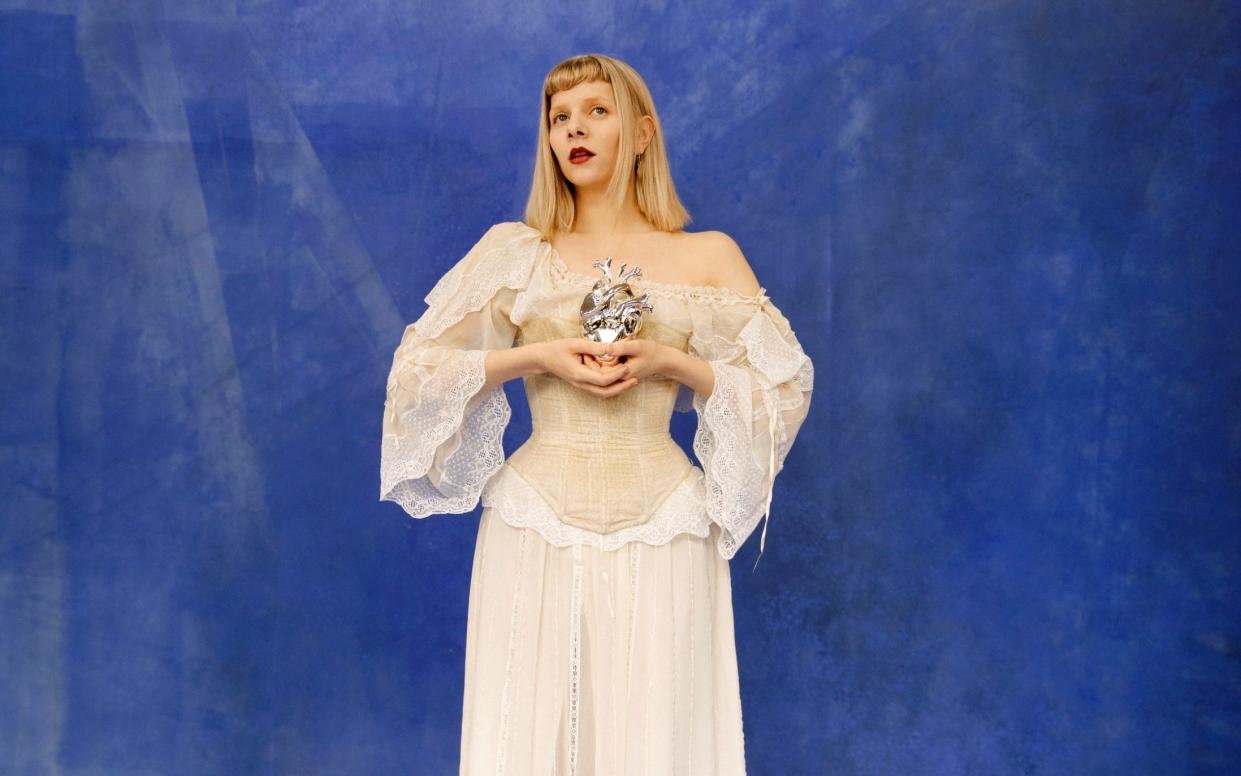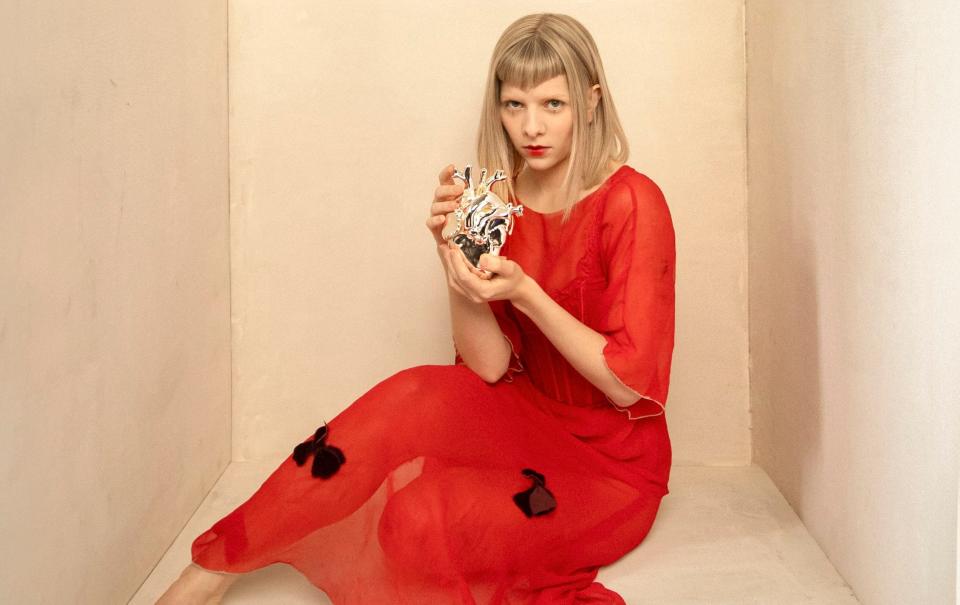How Aurora awed Billie Eilish, met Leonard Cohen’s lover and sang her way out of the Norwegian woods

“I’ve always known how to sing,” says Aurora Aksnes, in her soft, clear Norwegian accent. “I never really get tired. I can sing for 12 hours. And have a pint of Guinness. And still sing!”
There is something very special about the 27-year-old singer, songwriter and producer known simply as Aurora. Her music is extraordinary, but in person she is enchanting too: warm, witty, intense and slightly unearthly. She dresses with colourfully eccentric flair, and her wide eyes lock on to yours as if she is trying to peer into your soul, or let you see into hers.
The youngest of three sisters, she was raised by her mother, a midwife, and father, a salesman, in remote western Norway as a “person of the forest”, as she puts it, playing piano, writing songs and dancing from an early age. Her intimate and original compositions soon found an audience online and, at 18, she was given a record deal by Decca. Her breakthrough 2015 single, Runaway, has had more than 870 million streams on Spotify (where she has more than 12 million monthly listeners) and in excess of 640 million views on YouTube. Among her early fans was a young Billie Eilish, who has since said “When I saw Aurora, something inside me clicked, like, that is what I want to do.”
While Aurora tends not to trouble the weekly singles charts, her atmospheric music has appeared on the soundtracks to countless video games, TV series and films – and that’s her you can hear singing Into the Unknown, the most irresistible earworm in Frozen II, alongside Idina Menzel. Or you might know her from the 2015 John Lewis Christmas ad, for which she invested an interpretation of Oasis’s Half the World Away with her signature gentle intensity.
Yet her true talent is most evident in her own poetic songs that range from the intimate to the epic and provide a showcase for a clear, high, expressive voice that seems able to go anywhere she wants it to, in productions that blend folk, classical, techno and pop. Enya, Bj?rk and Kate Bush are clear influences, but you could throw into that mix the world-funk blend of Peter Gabriel, the shiny electronic dance spirit of Robyn and the synth psychedelia of The Chemical Brothers. “It’s very hard when people ask what kind of music I do,” she says. “I just like to say I make good music. It’s something I bring from within, like a human organ. I’m an organ donor!”
Released next month, Aurora’s fourth album What Happened to the Heart? is her strongest yet – a vividly emotional set grappling with loss, grief and recovery that somehow shines with a spirit of positivity. “It is not a breakup album,” she insists. “Well, not in the traditional sense of breaking up with a lover. But it has a lot of the same sentiments: saying goodbye, accepting change. It’s about the healing process, and how we deal with pain.” Although she has previously claimed that she doesn’t write from autobiographical experience, she acknowledges that, on this occasion, personal upset (about which she doesn’t wish to go into detail) was involved.
“Usually, I don’t write when I’m sad,” she says. “I don’t want to write in a way that worships the pain; I feel I should heal first, and then I can put light and wisdom in there. But this time it was very urgent. I really felt the need to pour out a lot.”
Yet if the new album draws on individual sadness, it also taps into Aurora’s sense that “something is seriously wrong in the world. While I was writing and recording, wars were breaking out. I could not contain this anger and rage on behalf of the underdog. The music got quite wild and dark.”

As her audience grows, Aurora considers it her responsibility to speak out about the issues that matter to her, whether the state of the environment or LGBTQ+ rights. “It’s not the 1940s any more, a modern star should be in touch with the world,” she says, adding, “Art without politics is a bit boring.”
When Aurora was young, she wanted to be a scientist, perhaps in the field of “molecular technology”, she says – “I still might; life is long!” – but then music took over. “I listened to Bob Dylan and Leonard Cohen, because that’s all the music we had in my childhood home, in the forest countryside in Norway. So when I started writing, I thought that music should say something big.”
She notes that during the 1980s when Cohen’s career was failing in the rest of the world, he was sustained by his popularity in Norway. “He had something otherworldly, that felt like an ancient reminder of kindness and grace in a world that can be very ungraceful and unkind.” Aurora tells me with delight that she knew Marianne Ihlen – Cohen’s lover and the subject of his classic 1967 song, So Long Marianne – who died in 2016, aged 81. “She was from the same village as my grandparents. She was so beautiful.”
There is something discernibly Norwegian about Aurora’s own music, full of allusions to long, dark winter days and the return of the light brought by spring. “It’s funny how deeply the sadness is rooted in the darkness,” she says. “You hear it from way back in our history, in every children’s song; they are all super sad, with heavy melodies, a dead mother, a dead child, a troll in the mountains that’s lonely. When the darkness comes, we hibernate. I read and sleep and cook and light candles, I ask of myself nothing. When everything blossoms, I write a lot; from February to October is [when I’m at] my most creative. Even though the winter months are hard, it’s worth it, because spring is just bliss.”
She believes that music is the ideal medium not only to express that bliss, but to inspire it, too. “I think it reminds people that they have power and hope and potential,” she says. “There’s so much fear in the media, and it makes us very easy to control, because any animal or human in fear makes bad decisions. Music can speak about the same things, but it’s fuelled by love.”
When I point out that images of death and mortality haunt the new album, Aurora laughs – “Well, I am Norwegian!” – before insisting that, ultimately, she won’t allow the gloomy state of the planet to crush her positive spirit. “I’m not pessimistic, but I can sound like it,” she says. “It’s an odd world, that’s all I really want to say. I find it very strange, but also very beautiful.”
Aurora’s What Happened to the Heart? will be released on June 7 by Decca
